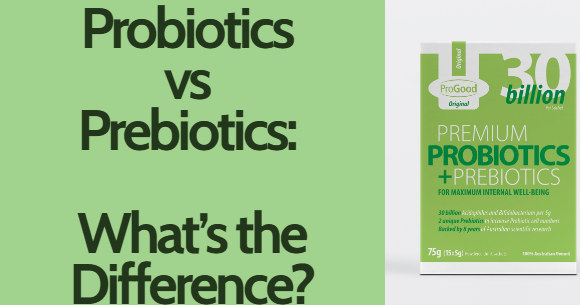We get this question a lot at ProGood. What is the difference between a probiotic and a prebiotic? Why do we put them together in our ProGood formula? Here's the breakdown:
Probiotics are live, beneficial bacteria found in certain foods and supplements. Their main role is to help maintain or restore the balance of good bacteria in your gut, supporting digestive health, immune function, and even potentially influencing mood and weight management
Prebiotics, on the other hand, are non-digestible fibres found in foods like bananas, onions, garlic, whole grains, and artichokes. These fibres aren’t digested by your body, but instead serve as food for the beneficial bacteria (probiotics) in your gut, helping them grow and thrive
A helpful analogy: if probiotics are the seeds (good bacteria), prebiotics are the fertilizer that helps those seeds grow and flourish
| Feature | Probiotics | Prebiotics |
|---|---|---|
|
What are they?
|
Live beneficial bacteria | Non-digestible fibres (food for bacteria) |
|
Main function
|
Add good bacteria to the gut | Feed and support existing good bacteria |
|
Food sources
|
Yogurt, sauerkraut, kimchi, kefir |
Bananas, onions, garlic, whole grains |
|
Sensitivity
|
Sensitive to heat and stomach acid | Resistant to heat and stomach acid |
Why Are Probiotics and Prebiotics More Effective Together?
Probiotics and prebiotics work best in tandem—a relationship often described as “synergistic.” Here’s why:
-
Probiotics need prebiotics to thrive: For probiotics to establish and multiply in your gut, they require a steady supply of prebiotics as fuel. Without prebiotics, the beneficial bacteria may not survive or function optimally
-
Better gut health: Consuming both together (sometimes called “synbiotics”) helps balance your gut microbiome more effectively, supporting digestion, immune health, and reducing inflammation
-
Improved resilience: Prebiotics help probiotics survive harsh conditions in the digestive tract, increasing the likelihood that the good bacteria reach your intestines alive and active
“Think of the probiotic being the good bacteria and the prebiotic feeding the good bacteria… They work together and support each other.”
— Dr. Luis Rustveld, Baylor College of Medicine
Key Takeaways
-
Probiotics add beneficial bacteria to your gut, while prebiotics feed and support these bacteria.
-
Including both in your diet—through foods or supplements—can maximize their benefits for digestive health, immunity, and overall well-being
-
For optimal gut health, aim to consume a variety of probiotic-rich and prebiotic-rich foods daily.
By understanding and combining both, you’re giving your gut the best chance to stay balanced, healthy, and resilient.


